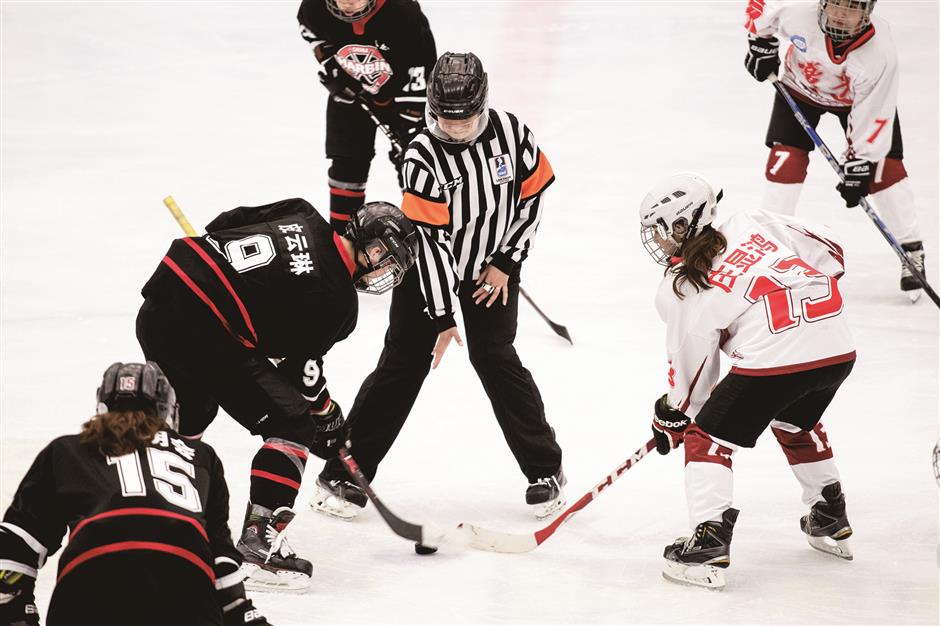China hockey eyes foreign talent hook up

A member of the Harbin women’s ice hockey team (center left) vies for the puck with a member of the Guangzhou women’s ice hockey team (center right) at the start of the game at China’s National Ice Hockey Championships in Beijing.
The women from China’s far northeast, who spent childhood winters whipping around on frozen lakes and rivers, towered menacingly over the other team as they faced off for a puck drop.
At China’s national Ice Hockey Championships last month, the Harbin squad conquered contenders from China’s sultry southern city of Guangzhou with a lopsided 51-0 score, that saw Kong Minghui slap shot after shot into the net.
Yet despite their dominance, Kong and her skillful teammates may not have enough in the tank to power China’s national team to medal glory when the country hosts the 2022 Winter Olympics in Beijing.
The national hockey team might bend the nation’s rigid single-citizenship rules to recruit overseas talent and beef up their squad, insiders say.
“What we have to do going forward is play in more international tournaments and get more practice playing against top teams,” Kong said.
The highly unusual move to seek foreign talent is a sign of how far China is willing to go for success at its home Winter Olympics.
With a population of nearly 1.4 billion, China is pushing hard to promote ice hockey and other winter sports ahead of the Olympics after winning nine medals, including a lone gold this year, at Pyeongchang, South Korea.
Both China’s men and women hockey teams will compete in the winter games, since host countries traditionally earn a spot in the competition.
The national and local governments have been pouring money into new facilities, equipment and training for players and coaches in the past few years, with the majority of the new ice rinks being built in shopping malls.
But it remains to be seen whether Beijing will grant citizenship to foreigners to strengthen their rosters, following in the footsteps of Seoul for the Pyeongchang Olympics. Out of 25 players on the South Korean men’s ice hockey team during the winter games, seven were foreign nationals with six coming from Canada, including goalie Matt Dalton.
Mark Dreyer, editor of China Sports Insider, said China will likely recruit only foreign players with Chinese roots.
“There’s been no official policy saying this, but recruiting policy has been clear throughout tryouts in North America. New recruits must have at least some Chinese ancestry,” Dreyer said.
Such a move would allow China to expand its player pool, while encouraging engagement with the Chinese diaspora.
However, China does not currently recognize dual citizenship. To become a naturalized Chinese citizen, a foreigner would have to give up his or her previous citizenship, making the option undesirable to many foreign hockey players.
“Would the players be able to keep their other passports? If this does somehow happen in ice hockey — which now seems possible — we would likely see other sports following suit,” Dreyer said.

Members of the Harbin women’s ice hockey team takes part in China’s National Ice Hockey Championships in Beijing.
In March, at the Canadian Women’s Hockey League final, China burst onto the international hockey scene with a new squad that was a special mix of Chinese nationals and overseas Chinese.
Kunlun Red Star, one of two private teams formed this year to prepare Chinese talent for the 2022 Olympics, has a special mix of Chinese nationals and overseas Chinese for its male and female teams.
The Kunlun women shocked hockey observers by making it all the way to the Clarkson Cup finals in Toronto, narrowly losing to Ontario’s Markham Thunder after an extra time goal — but proving that Chinese teams can compete with world-class clubs.
In May, the Kunlun teams went through a grueling official Olympics training camp alongside foreign players and coaches in the Chinese city of Shenzhen.
Participation in Kunlun is optional for China’s national team players and provides them with more opportunities to play in top world tournaments. “(We) are now choosing the best Chinese and overseas players to cultivate talent for the Chinese women’s hockey team for 2022,” Kunlun manager Zhou Song said.
“We assembled 22 outstanding overseas Chinese-origin players. They will have a chance to fight for their country in the future.”
Kunlun provides a competitive salary plus bonuses for players, with the help of private sponsors such as Chinese real estate developer Vanke.
However well or poorly the Chinese hockey teams perform at the 2022 Olympic Games, they are already setting new precedents for sports policy in the country.
Supportive family members say the promising performance of female players in particular will also help to improve women’s overall status as professional athletes.
“I didn’t want my daughter to play hockey at first. I wanted her to focus on school. But within 30 minutes of being on the ice for the first time, she seemed like she was at home,” said Yang Dong, father of Harbin player Yang Kaiqi.
“We are very proud of her.”















